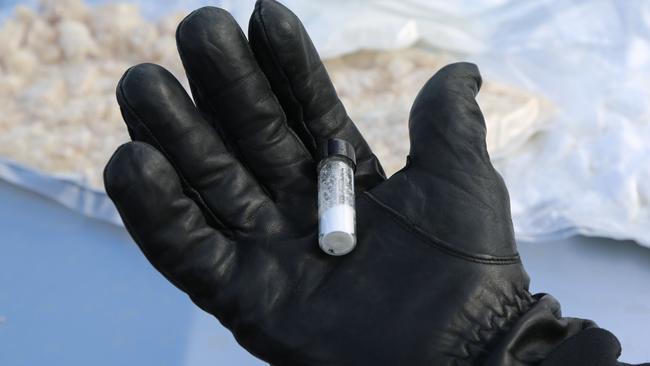The drug ice has caught us out cold
THERE are two issues with the ice epidemic that astonish me. The first being the painfully slow reaction by governments to recognise the problem.

Opinion
Don't miss out on the headlines from Opinion. Followed categories will be added to My News.
THERE are two issues with the ice epidemic that astonish me. The first being the painfully slow reaction by governments across the nation to recognise the problem.
The ice crisis began to take hold nearly a decade ago, yet it is only in the past 12 months that any meaningful action to combat the problem was initiated and that was by the Abbott government.
Mind you, a travelling talkfest in the shape of the Ice Task Force would not have been my first choice in planning a reaction to this national scourge.
The community meetings held across the country will basically tell us what we already know — ice is devastating our rural communities just as it has done in America’s heartland, the mid-west and southwest.
In fact, we only had to look at the US experience with methamphetamine to see what was likely to develop in Australia. Had we done that, we might not have stopped this epidemic but we could have limited the impact.
Now, the problem is so large only radical, out-of-the-box strategies have any hope of turning the tide against this lethal epidemic.
The second frustrating issue is the emergence of “experts” who suggest legalising drugs such as ice. Can you for a minute picture a free-for-all environment where anyone and everyone in the community is openly allowed to use and abuse mind-altering drugs such as ice?
Can you imagine the chaos and carnage on our roads, on our streets, as drugged-up individuals just do as they please because they have little or no control over their actions?
It is becoming apparent that ice abuse is responsible for a growing number of horrific murders, including the recent double murder of a grandmother and a young child here in Sydney. The alleged culprit was a “meth addict” and had spent some time recently in rehab.
These incidents are a sign of what is to come as the abuse of ice in the community grows and more people become susceptible to uncontrolled violent acts on mostly innocent people.
Allowing anyone to legally use a drug such as ice is madness not a solution.
Just as baffling is the announcement by the federal government of a $1 million grant to Crime Stoppers to help combat the ice epidemic.
Hiring more telephone operators is not going to stop the supply and use of drugs. More Police on the ground to deal specifically with ice manufacture and supply will.
That is where the $1 million should have gone, to cash-strapped local police forces unable to devote the resources that the ice problem deserves.
Regional or Rural Drug Units need to be put in place now across the country before ice devastates our agricultural communities. In that regard, the rural ice problem is a national problem for all sorts of reasons, including food security for a growing population.
The usual calls for more money for rehabilitation and education is to be expected, after all, it is now an industry and employs tens of thousands of near-unemployable tertiary graduates.
If you look at this country’s drug usage per capita of population, you would have to say that drug education has failed spectacularly and the vast sums spent on this education monster need to be reviewed immediately.
Then there is the rehabilitation lobby, always looking for more taxpayer dollars, more investment by government and a greater slice of the billions spent on the healthcare system.
I agree that rehabilitation is a vital tool in the war on drugs, but not in its current form of “opt-in” and “opt-out”. What we need is the Swedish model of compulsory rehabilitation for at least six months or longer, and for courts to deal with any relapse with mandatory sentencing. But what Sweden has done more successfully is to make drug use socially unacceptable just as Australia has done with the much-maligned smoker.
Smokers in reality are more scorned than your average pothead or ice addict. Smokers are confined to small, secluded areas and face harsh fines if caught smoking in certain public areas.
Meanwhile, hordes of ice- addicts roam the streets at will, satisfied that they are protected by all sorts of do-gooders who view drug addiction as purely a medical problem. It is not a medical problem until they become addicted. Prior to that it is a legal or police problem, and if society can step in at the very earliest stages of ice abuse and impose compulsory rehabilitation options, then we may have a chance of preventing a large portion of our young people falling prey to this evil scourge.
Tim Priest is a former NSW detective


